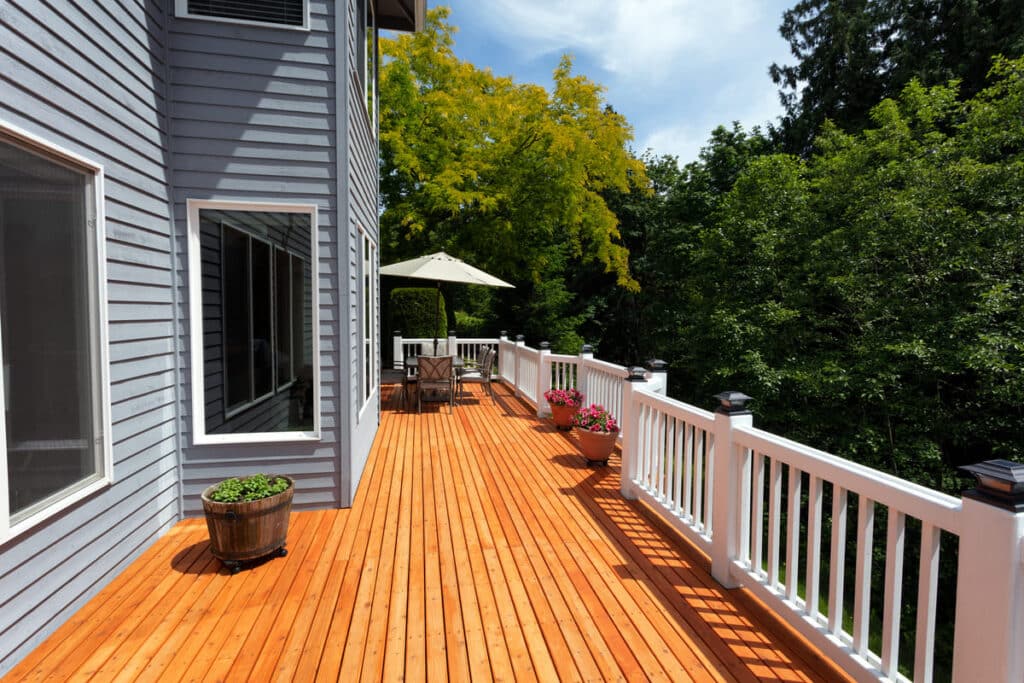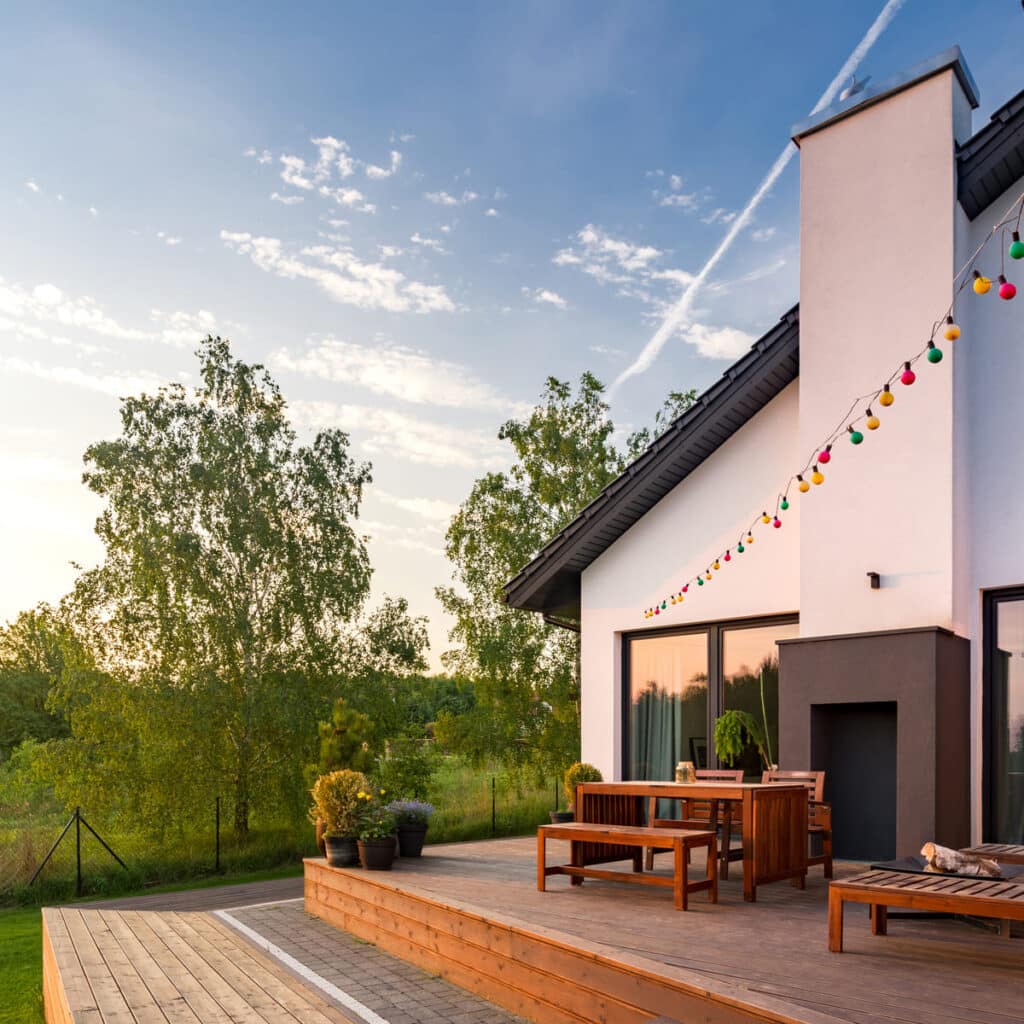Adding a deck to your Massachusetts home has lots of benefits. Not only does it extend your outdoor living space, it also adds value to your home. One of the first questions homeowners ask when considering a new deck is: What’s the best decking material to use, especially for our area?
The three main types of decking materials our team at Beantown Home Improvements uses are wood, composite and PVC. Which one is best for your needs? This guide will discuss the pros and cons of composite decking vs. wood for decking material options to help you plan and budget for your new decking project.

Understanding Your Decking Material Options
All decking options add style, beauty, and value to your home, and each type of material has its pros and cons. While wood has been the decking choice for years, today, the composite and PVC decking market is growing due to advances in manufacturing technology, its affordability, and its versatility.
Composite and PVC decking are becoming an eco-friendly option for decking materials. Most composite decking is a blend of recycled wood fibers, recycled plastic products, bonding agents, and tints to add color, while PVC decking solid cellular PVC. At Beantown Home Improvements, we install decking material from AZEK, TimberTech, and Wolf, which is made from 94% recycled materials.
Popular wood decking choices include Redwood, Cedar, Teak, Ipe, and Mahogany. These woods are generally resistant to rot, insects, and weather. Our decking experts can work with you to help you decide what type of wood decking is most suitable for your home.
The Pros and Cons of Composite Decking
Composite decking is ideal for its durability and low maintenance requirements. However, it has a higher upfront cost than wood and can get quite hot. Below are some of the pros and cons of composite decking.
Pros
- Minimal maintenance. This type of decking requires minimal maintenance without having to sand, seal, or stain. In general, you only need to wash your composite decking a few times a year.
- Durable and long-lasting. Composite decking is ideal for the weather conditions in Southeastern Massachusetts. It can withstand damage from UV rays in the summer and doesn’t warp or crack from rain, ice, or snow.
- Versatile appearance. This type of decking material can look like wood grain in various plank lengths with a wide range of color options. In addition, composite decking has a uniform look for a neat appearance.
- Eco-friendly compositions. Depending on the company, composite decking is often made with recycled materials, usually from items destined for the landfill.
Cons
- More expensive initial cost. Homeowners on a budget may have difficulty justifying the initial upfront cost of composite decking. However, with less maintenance required, the upfront cost can be offset by maintenance costs.
- It can get hot. Because of the composition of this type of decking material, the surface of your deck can get hotter than wood decking. You’ll have to watch the kids running barefoot on the deck during the summer so they don’t burn their feet.
- Color fading. If your deck is in the full sun, the UV rays can cause fading over time. This may create an unsightly appearance on your deck.
The Pros and Cons of Wood Decking
For years, wood decking was the choice for homeowners in the greater Boston area.
Pros
- Natural beauty. Wood decking showcases the natural grain and color of the wood, from the rich red found in redwood and red cedar to the intense dark colors and grain patterns found in teak, ipe, and mahogany.
- Lower initial cost. Wood decking, even exotic woods, has a lower upfront cost than composite decking. While it costs less to buy wood decking materials, you do need regular maintenance to keep it looking new.
- Creative options. Wood comes in various grain patterns, which can add a creative flair to your decking. One of the positive aspects of wood decking is the option to stain it with a color to enhance your home’s exterior.
Cons
- Maintenance costs. Wood decking needs to be sanded, sealed, and stained regularly to keep it looking new and prevent it from becoming damaged due to weather.
- Prone to insects and rot. While some woods have some natural resistance to insects and moisture, wood is generally more prone to damage from weather. Your wood deck needs special treatment to keep it weather and insect-resistant.
- Doesn’t last as long. Because wood is a natural material, it does eventually deteriorate, even with regular maintenance. Eventually, you’ll need to replace the planks.
The Pros and Cons of Solid PVC Decking
Pros
- Low maintenance: Does not require staining or painting, unlike wood.
- Durable: Resistant to rotting, warping, and insect damage.
- Stain and fade resistant: Offers a 30-year stain and fade warranty and resists stains from spills like ketchup and cooking grease.
- Moisture and mold resistant: This makes it a good choice for areas prone to moisture.
- Aesthetics: Available in a wide selection of colors and grain patterns that mimic the look of real wood.
- Lightweight: Easier to install, and it is often the best choice for fire zones.
- Fire resistance: Engineered PVC is more fire-resistant than traditional wood.
Cons
- High upfront cost: It is generally more expensive than wood or some composite options.
- Heat retention: Can get hot in direct sunlight, though Azek claims its products get less hot than some competitors, and darker colors will be hotter than lighter ones.
- Expansion and contraction: Humidity and extreme temperatures can cause the material to expand and contract, which can lead to cracking if not installed correctly.
- Scratch resistance: Some sources suggest other brands like Trex may be more scratch-resistant.
- Stiffness: May be less stiff than other materials, potentially leading to some bouncing with standard joist spacing.
Cost Comparison of Wood, Composite and PVC Decking

When doing a cost comparison of wood, composite decking and PVC decking, you must weigh the overall cost of maintenance over the initial cost. When you have a consultation with our decking team at Beantown Home Improvements, we’ll consider certain factors such as the size of the desired deck, site preparation, extra features, accessories, and decking material to help establish a budget for your unique needs.
Maintenance Requirements and Climate Considerations

Composite and PVC decking only needs minimal maintenance, like washing it off a few times a year, while wood decking requires sanding, staining, sealing, and plank replacements. One of the many benefits of composite and PVC decking is that it can stand up to the harsh weather often experienced in Massachusetts, like intense UV rays in the summer and ice, snow, and rain in the winter.
Transform Your Home With a New Deck
Are you ready for your new deck project for your Massachusetts home? Our Beantown Home Improvements experts can help you decide what type of decking material to choose for your home. Contact us to learn more about our decking services, design process, and installation costs. Take advantage of our free consultation to begin the process of your new deck, whether you choose composite or wood decking materials.
